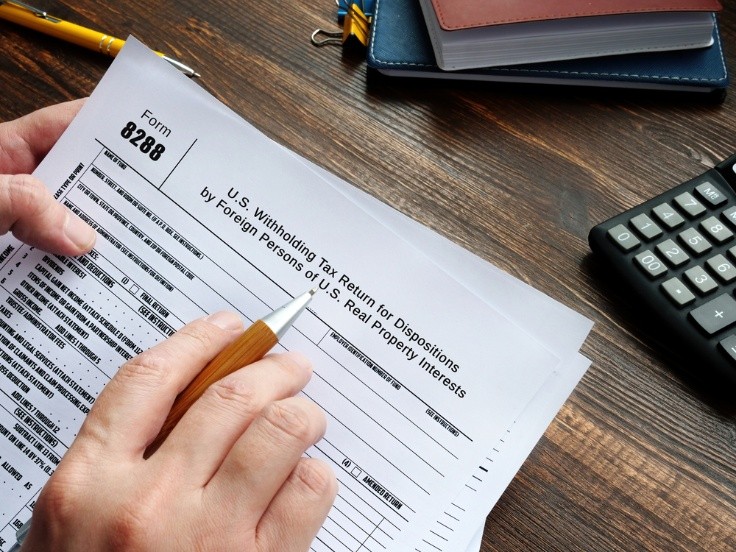-
U.S. Office Address: 2319 S.W. 29 Ave., Miami, Fl. 33145
U.S.Mailing Address: 2520, Coral Way, Suite 2014, Miami, FL 33145
U.S. Number: 754-368-2330

When foreign nationals sell U.S. real estate, they’re not just walking away with a check — they’re subject to U.S. tax laws. The Foreign Investment in Real Property Tax Act (FIRPTA) requires buyers to withhold a portion of the sales price and send it to the IRS. At the heart of this process lies Firpta Form 8288, the IRS form used to report and transmit that withholding. In this blog, we break down what Form 8288 is, why it matters, who files it, and how it fits into the broader FIRPTA compliance system.
FIRPTA Form 8288 is an IRS document titled “U.S. Withholding Tax Return for Dispositions by Foreign Persons of U.S. Real Property Interests.” When a foreign person or entity sells real estate in the United States, FIRPTA requires that the buyer withhold a percentage of the total sale price—generally 15%—and remit that amount to the IRS.
Form 8288 is the official way to do that. It’s not just a payment slip—it’s proof that the transaction is being handled according to federal law. This form is used to report the sale, document the buyer and seller information, confirm the amount withheld, and officially notify the IRS.
In most cases, this form is filed alongside Form 8288-A, which serves as a supporting statement for each individual foreign seller involved in the transaction.
One of the most misunderstood parts of FIRPTA is who is responsible for filing. Contrary to what many assume, it’s not the foreign seller who handles this form. Instead, the obligation falls on the buyer or their authorized withholding agent, such as a title company or closing attorney.
If you’re purchasing property from a foreign individual or corporation, you must verify their residency status and prepare to withhold the correct amount—even if the seller doesn’t mention it. Failure to do so could make you, the buyer, personally liable for the withheld taxes plus interest and penalties.
Although the form itself may appear short, it includes several important fields that must be completed accurately. These include the names and addresses of both the buyer and seller, taxpayer identification numbers, the legal description of the property, the sales price, and the exact amount withheld.
A completed Form 8288 package usually includes:
Every element must be correct. An error in any field—especially the TIN (Taxpayer Identification Number)—can cause IRS rejections or refund delays for the seller.
The IRS sets strict deadlines for FIRPTA compliance. The buyer or withholding agent must file Form 8288 and Form 8288-A, along with the payment, within 20 days of the property transfer date.
Missing this window could result in significant financial consequences. It’s vital to prepare these documents well ahead of closing and confirm whether any exceptions or reduced withholding rates may apply.
In some cases, the foreign seller may apply for a withholding certificate using Form 8288-B, which could lower or eliminate the withholding altogether—but this form must be submitted before closing, and approval can take 90 days or more.
To navigate FIRPTA properly, it’s essential to understand how Form 8288 works alongside its related forms.
These three forms form the foundation of FIRPTA compliance and are often interlinked in a single transaction.
Form 8288 may seem straightforward, but it’s easy to make critical errors. Incorrect taxpayer IDs, inaccurate sale prices, late submissions, or failure to attach the right forms can all result in penalties or delays. Buyers should never assume the seller’s tax status—proof is required in the form of a W-9 (for U.S. sellers) or W-8BEN (for foreign sellers).
At the same time, foreign sellers who don’t submit 8288-B in time often lose the opportunity to lower their withholding, even when their actual tax liability is far less than 15% of the sale price.
These are not issues you want to resolve post-closing. Upfront compliance is the only safe path.
If you’re a buyer, seller, or real estate professional involved in a cross-border transaction, handling FIRPTA paperwork correctly is non-negotiable. FIRPTA Form 8288 is more than a bureaucratic requirement—it’s a legally binding tax document with significant financial implications.
At Firpta Tax Returns, we specialize in simplifying this process for our clients. From preparing and submitting Form 8288 to coordinating the full package with Forms 8288-A and 8288-B, our team ensures every box is checked and every deadline is met.
We also help foreign sellers file their U.S. tax returns to claim potential refunds and assist with all associated compliance needs. Whether you’re an individual investor or a real estate agency, we make FIRPTA simple, accurate, and fully IRS-compliant.
Explore full-service solutions for all your Firpta Forms with Firpta Tax Returns—where real estate tax gets real support.